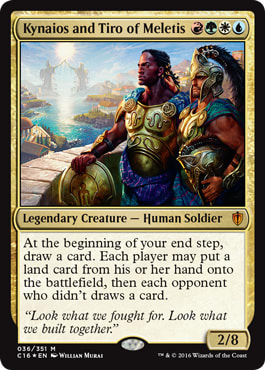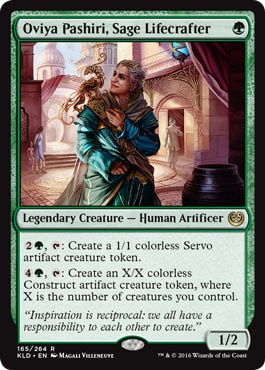I fully expected the issues raised by Ixalan to circle around colonialism, the tradition of serialized pulp adventure stories, the way fantasy stories treat complex cultures, and the block's attempt to capture something of the same spirit as Original Flavor Zendikar. (Remember when Zendikar was the Adventure Plane, the D&D plane, before it turned into The Eldrazi Ate This Plane plane?) Then the first Jace story came out and it was clear on some level Ixalan was going to be a story about trauma. Much of the story has born this out. Jace and Vraska's arcs both revolve around trauma and memory. Then there's the wider multiversal conspiracy deep lore stuff, which, surprisingly maybe, has been something less of a focus for me. Ixalan managed to side step, on the page and cards at least, some of worst possible tendencies of Pulp Adventure Serials. So, while there was a bit to talk about with its advertising on the whole, there's not been tons to say. That really caught me by surprise though was a pulp adventure angle that came sort of out of left field:
The pulp adventure romance.
Now that I type that out I have to confess my mind is basically flooded with visions of Vraska standing in a way that shows off her muscles atop some seaswept crag while Jace lounges in his . . . belt-corset? at her feet. It's genuinely pretty awesome.
But I can't shake a feeling of irritation which I'll defer to community mainstay Vronos to express:
https://twitter.com/Vronos/status/920668431367786496
It almost seems superfluous to translate this, since the comparison isn't exactly subtle. Still, the particular barbs here are directed at the fact that Vraska was able to develop on-screen romantic interest in a dude she most recently was trying to murder, while Chandra and Nissa have languished in this weird status quo of vague allusion toward future romantic development without ever going anywhere.
I usually avoid getting caught up in shipping wars, maybe because of my aversion generally to making predictions. Analysis of a text after the fact is way more my wheelhouse. That said, analyzing snapshots of fandom culture IS in my wheelhouse and I think it's worth taking some time to parse out exactly why this is a sore spot for folks. Doing that means looking at the different contexts Ixalan's story exists in.
I'm not sure that Magic's story itself is the most important of these contexts, though. It's where we'll have to start, since it's the most directly relevant to getting everyone up to speed, but I'm not sure it's the most immediately impactful context.
Nevertheless, the close up context is that Nissa's been teased, pretty unambiguously for a while now, as a possible love interest for Chandra. The most well publicized event in this saga was the web team accidentally (apparently) publishing an earlier version of a story where Chandra and Nissa more directly talk about the possibility of having a romantic relationship. From what I recall there's also been discussion from the team about wanting to develop "Gruulfriends" naturally . . . but don't put too much weight on that part of the argument, because I and others are now having trouble locating exactly where that was said. Turns out we're still collectively kinda lousy at archiving these things in easily searchable ways.
All of this has taken place in the context of an apparently sincere repeated affirmation on the part of WotC that the queer fans of the company's stories matter. WotC had a presence at Seattle's Pride this year, and D&D has, in fifth edition, made strides (albeit sometimes stumbling ones) toward explicit textual inclusion of queer characters.
I'm uncomfortable ascribing motives here for reasons that I've expressed at length on my own blog. Beyond the always thorny question of authorial intent, we simply don't have more than a keyhole view into how the Creative Team, in concert with other executive bodies at WotC and Hasbro, made these decisions. There have been hints that there may be legal issues involved . . . but at this point I don't feel comfortable speculating as to what those might be, how strong their impact is, and whether what we're seeing overall is the dreaded "Queerbaiting"— a term for when storytellers string queer fans along with the hopes of representation that they have no intention of ever introducing to the texts themselves.
Still, even if I'm not ready to make a judgment about these things, general fans reading the stories aren't under any (self-imposed) editorial constraint, and it seems clear that this latest romantic subplot has fanned the flames again of folks who feel Magic the Gathering has been dragging its heels when it comes to explicit on-page and on-card representation.
This general atmosphere collided in Ixalan with the ongoing shifts in Magic's storytelling. Between Kaladesh and Amonkhet, we lost one short story per block, for one thing. That might not seem huge but it's 11% of the story overall. That's not inconsiderable. And Amonkhet had a relatively focused plot with two major sides. Ixalan has to set up four factions, and four not necessarily overlapping Planeswalkers. Even with Angrath reduced to a walk-on part, the story team has to develop Mindwiped!Jace, Vraska, and Huatli into complex characters over those eight stories without reducing Ixalan's natives to characterless scenery.
It's a bit of a lateral move, but I think it's helpful to think of these shifts in terms of genre context. Magic's setting is remarkable in that it can accommodate major genre shifts and still feel like Magic. (This is part of what puts it in the New Wave/Slipstream/New Weird tradition.) At the same time, though, the swerve from a serial narrative more analogous to prestige TV, in which weighty events and their impact on individual characters are explored in a long-term way, to a serial narrative playing with pulp adventure tropes, can cause some whiplash.
Jace and Vraska's budding romance makes sense from a genre perspective. Jace losing his memories gives the narrative an opportunity to explore a swashbuckling romance adventure, and Ixalan balances this genre play with a grounding in the psychology of the characters in question. However, the compressed, dynamic storytelling of the pulp adventure serial just happened to emerge conveniently when it was time to ship (so to speak . . . ) two straight characters. I'd argue that the individual handling of each storytelling mode makes sense . . . but they exist as part of the same overarching story. This can make Ixalan's rush to give Vraska and Jace romantic chemistry feel contrived when juxtaposed with Magic's other storytelling modes.
In this sense, all the contexts might be collapsed into one context: the juxtaposition between how straight and queer romance is treated culturally. This is the broadest scope, and, paradoxically, the scope that weighs most heavily on Magic while being the hardest to apply as a kind of standard.
Within this scope, we can see pretty clearly that queer stories — like all diverse narratives — are held to an insurmountable standard of timeliness, development, necessity, relevance, and so on and so forth. We're continually bombarded by demands to prove that diversity hasn't been "forced" — whatever that means. And don't forget the remarkable way these stories must simultaneously "not make a big deal out of characters' sexualities," "not be stereotypical," "not distract from The Story," and yet "not be tokenizing."
It's difficult not to feel, in this context, that Jace and Vraska being given the chance at a whirlwind romance is patently unfair. Leaving aside all these questions of what the "best" way of writing queer romances is, the blunt fact of the matter is that Nissa and Chandra have not been PERMITTED to have a whirlwind romance. Straight couples in media are afforded the opportunity to explore somewhat exaggerated, silly, fanservicy romances.
Gay couples aren't even permitted to SURVIVE.
I continuously hear responses to these sorts of critiques along the lines of, "Well I just hate all romance." This is not helpful. I'm sympathetic to Ace folks weary of alienating narratives. And sure, we can have a discussion about the merits and drawbacks of self indulgent fanservice romance. But we also live in a culture where romance is coded feminine and geek culture is deeply affected by toxic masculinity. It's impossible to miss the fact that these Principled Haters Of Romance only come out of the woodwork when a story threatens to cater to the desires of anyone not a straight dude. I don't think it's unfair saying this feels disingenuous at best, and at worst I have to suspect the argument's being offered in plain bad faith.
If you want a story without romance, look to Huatli and her relationship with Angrath. You know: ~tale as old as time, Warrior-Poet and the Flaming Murdermonster Trying To Convince Her To Help Him Shatter The Weird Forcefield Around The World Preventing Him From Leaving.~ I don't think that's going to turn into an epic romance story anytime soon, not the least because Angrath is a character so thinly painted that his name is literally just "anger" and "wrath" mashed together. This, honestly, is part of his appeal, from a pulp adventure perspective.
If you want me to get behind a call for actual aro/ace representation in Magic, I'm there for you comrade! If the story's going to be exploring love, exploring the nuances and complexities of desire and attraction is on the table as well. Given the only explicitly ace character I can think of is on freaking Bojack Horseman, I'd say we can use some more representation there.
But if you see queer fans expressing frustration at fundamentally different treatment, within a wider cultural context of deep power disparity and oppression, as the opportune time to bloviate about how you "hate all romance, actually," I invite you to tell it to someone who cares. There's plenty of interesting conversations to be had. None of them start with smug dismissal of our concerns.
Now, to be clear, none of this is to say Gruulfriends is unambiguously good, and Belligerent is unambiguously bad. Like I said above, if the broad social context for this storytelling weighs heavily on Magic, its very broadness and weight makes it a lousy precision tool. I'm not sure it's fair to hold Magic the Gathering accountable for what is, ultimately, the sin of an entire media landscape. (Roasting fellow fans over their shipping preferences seems even more questionable as praxis, notably.) But the contexts exist and shade fandom's reaction to the storyline.
What I hope I can do here is lay out the basic sources of this frustration and push the discourse beyond the more egregious double standards and argumentative blind alleys when it comes to judging queer fiction. There's real complexity here to responsibility and execution, and I don't want to elide that . . . but man, it would just be nice, from a queer perspective, to see the kind of flight of fancy romance narrative that Jace and Vraska have been afforded.



























